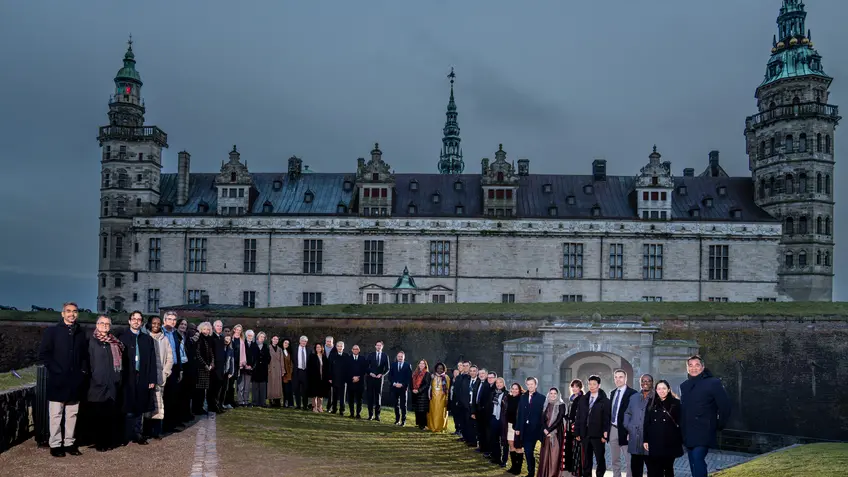Integrating Climate and Development for Adaptation Finance at the Copenhagen Climate Ministerial
Photo: Danish Ministry of Climate, Energy and Utilities / Adam Rieper
We are at a critical juncture for global climate action. Reaching the goals of the Paris Agreement and driving sustainable development requires integrated and scaled up efforts that align with the findings of the Global Stocktake.
Denmark, Co-Chair of the NDC Partnership, hosted the Copenhagen Climate Ministerial on 21 and 22 March to pave the way for a successful COP29 and build upon the historic United Arab Emirates (UAE) Consensus achieved in Dubai at COP28.
Co-hosted in close collaboration with the COP presidencies of the UAE and Azerbaijan, the Ministerial convened nearly 40 global climate leaders and ministers to kickstart the process of pushing for an ambitious COP29 result. At the opening plenary of the event, a Troika comprising the UAE, Azerbaijan and Brazil - Presidencies of COP28, COP29 and COP30 respectively – was announced, following the release of their Letter to Parties outlining their "Roadmap for Mission 1.5.”
Discussions over the two-day Ministerial focused on advancing mitigation ambition and implementation, strengthening adaptation action and global resilience, implementing and raising ambition of NDCs, and finance. NDC Partnership Global Director Pablo Viera shared insights and ideas stemming from the Partnership’s ongoing support to over 100 developing countries, including dedicated support for the development of NDCs 3.0.
Building on the opportunity, a coalition of international climate organizations hosted a series of consultations and a high-level event to collect and share recommendations for integrating climate and development for adaptation finance. The recommendations were delivered to inform the Ministerial process and guide upcoming regional and international events leading up to COP29 and COP30, such as the Climate and Development Ministerial, UNGA Summit of the Future and the G20 Summits.
Through this high-level event and stakeholder consultations, leaders delivered a roadmap of key considerations and recommendations in line with the Global Stocktake, including:
- Drastically improving and scaling up the delivery and disbursement of public and private finance for adaptation.
- Integrating the next round of NDCs with long-term development strategies, prioritizing adaptation, and translating them into comprehensive climate investment plans.
- Implementing a country-owned programmatic approach to channel funds through national platforms, including to the subnational level, for adaptation efforts.
- Simplifying and harmonizing procedures for accessing adaptation finance, with measures such as accelerated timelines, accreditation support and use of climate resilience clauses.
- Strengthening efforts to attract private adaptation investments through practices like de-risking, transparent policies and promoting multi-stakeholder partnerships.
- Applying a risk and resilience lens to ongoing reform of the International Financial Architecture to ensure future flows contribute to adaptation.
- Leveraging innovative finance to mobilize adaptation funds for integrated climate and development, focusing on adaptation and resilience.
The coalition organizations, including the NDC Partnership DanChurchAid, E3G, the International Institute for Environment and Development (IIED), CONCITO and the UN Foundation, co-hosted the hybrid event Integrating Climate and Development for Adaptation Finance to present and discuss the recommendations through a public panel.
“The recommendations are clear; in fact, they are what we are already doing and calling for. We have already developed the plans, but we are lacking the financing to actually implement”, noted panelist Toeolesulusulu Cedric Pose Salesa Schuster, Minister of Natural Resources and Environment and Lands of Samoa, and Chair of the Alliance of Small Island States (ASIS).
“Finance is the crux of the problem”, remarked panelist Tina Stege, Climate Envoy, Marshall Islands. “We have a lot of plans, but very little means to develop them. The money is out there, we just don't have sustainable, accessible or predicable funds for small and vulnerable countries to respond to climate change. If this continues, we might drown in reports and applications before the sea level itself rises.”
Representatives from the coalition organizations and panelists at the event emphasized the importance of addressing the financial challenges that continue to expand the gap between ambition and action. “The countries most vulnerable to climate change have been clear about what they need to adapt to it - more money, on fairer terms and channeled to local people who are best placed to use it,” said Ebony Holland, IIED’s nature-climate policy lead. “Governments meeting in Copenhagen have a chance to put down a marker for stronger climate outcomes later this year and to show they're taking lower-income nations seriously.”
"To unlock adaptation finance, we must step up collaboration between partners and countries, ensuring that country ownership is central to national climate action," said panelist Romeo Bertolini, NDC Partnership Deputy Director. The NDC Partnership is directly supporting countries in raising their ambition in line with the Paris Agreement and the outcomes of the Global Stocktake, including through the Global Call for NDCs 3.0 & LT-LED on LT-LEDS and NDC alignment, update and enhancement, as well as the upcoming NDC 3.0 Navigator.
For regular updates on the Partnership’s work to drive climate action sign up for our newsletter and follow us on social media.
